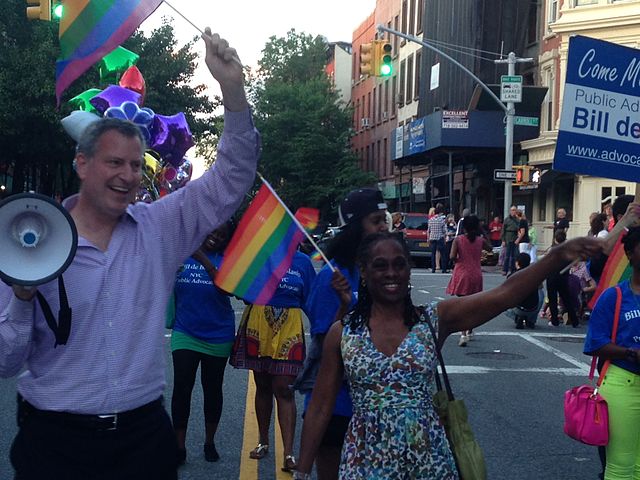
BY LINDY FU
Monkeypox – declared a public health emergency on August 4, 2022 – has dealt considerable damage to the physical and mental well-being of New York’s LGBTQ+ community.
98% of monkeypox patients are men who report to have sex with other men. Given that the topic of sexuality has always been a controversial one, a number of individuals have used this argument to further their more prejudiced agendas.
LGBTQ+ support groups and medical institutions alike have taken matters into their own hands in an attempt to both reduce the spread of the virus and eliminate harmful stereotypes surrounding the population that has primarily been affected by the virus so far.
‘Keep it in the bedroom”: Homophobic allegations on the rise
LGBTQ+ individuals have recounted experiences of prejudice first hand – bisexual individual Hale Rossi recounted that he was at his town’s local bar with his boyfriend during a busy hour. A group of men pressured the couple to give up their seats and told them to “keep their f–-ed up roleplay in the bedroom.” There was little to no intervention from the barista or other staff.
Another person in the LGBTQ+ community who asked to remain anonymous out of concern for their privacy has mentioned that they were called homophobic and transphobic slurs and following on the street.
“If I hadn’t walked into a supermarket to lose them, I fear what else would have happened to me,” they said.
All individuals interviewed have not contracted monkeypox – so how did this outbreak become such an impetus for significant prejudice?
Why monkeypox and LGBTQ+ culture go hand in hand
A key facet of LGBTQ+ culture are large events designated to celebrate pride, which can also be a catalyst for spreading disease due to relatively close contact among individuals. For example, the Gay Pride Festival in Yumbo de Maspalomas resulted in 100 positive monkeypox cases.
In addition, such events can promote increased sexual activity among their participants. According to Le Monde, 74% of patients with monkeypox reported having three sexual partners or more in the past 14 days before symptoms arose.
These findings highlight a common trend — however, this is an overrepresentation of monkeypox’s overall spreading potential.
“Monkeypox appears to be transmitted primarily by skin to skin contact,” said Maimonides Medical Center’s Director of Infectious Diseases Edward Chapnick. “It is also possible that there is some transmission by the respiratory route and body fluids (i.e. sexual transmission).”
When public health messaging claims that mainly queer-identifying people contract monkeypox, many will be quick to infer that monkeypox is a sexually-transmitted infection. This is due to the queer-related stereotype of sexual promiscuity which often bears a negative connotation and an insight to double standards when compared to men who identify as straight.
In spite of this, the fact remains that the monkeypox can just as likely be caused by factors other than intercourse. Simply sharing personal belongings contaminated with monkeypox and initiating skin-to-skin contact with another person can put one at risk of it.
And while LGBTQ+ people have objectively been the main victims of monkeypox, there is the chance for absolutely anyone to contract the infection.
“It’s harmful for people to believe that monkeypox cannot affect them just because people don’t identify with a certain sexuality.” Infectious disease researcher Dr. Boghuma Titanji said. “It could lead to people, gay or not, to fear being stigmatized. It could lead to them hesitating to step forward when they are infected, which can lead to a vicious cycle and worsen the issue altogether.”
When we falsely make out monkeypox to be an illness that ‘targets’ members who identify as a certain sexuality, this refers all of the onus to only one community which suffers a debilitating amount from monkeypox itself. Realizing from the get-go that this viral infection is all of our businesses is one step to making ourselves and others safer.
New hope for the afflicted – from inside and out
In spite of the tough spot people of LGBTQ+ identities find themselves in, the community has found support in community networks.
“We have set up support group talk sessions for any distressed members twice a week, and have even chipped in money to aid others who unfortunately contracted the sickness,” Vice-President of Stuyvesant High School’s Spectrum group Margaret Mikhalevsky said.
There has been a positive turnout to these sessions, as support groups are packed with individuals sending their encouragement to others and reaching out to other local pride organizations in the area.
Comprehensive treatments administered by professional health centers are also promising, considering the current situation of the LGBTQ+ community.
The New York State Department of Health has approved of hospitals using an antiviral medication known as tecovirimat (aka TPOXX or ST-246) that has worked on previous orthopoxes (i.e. smallpox and cowpox). Clinics have also been set up for the sole purpose of following up with these individuals and administering vaccinations as needed.
Along with precise dosages of medication, health care for the targeted demographics has expanded to more holistic treatments, such as cognitive behavioral therapy and counseling.






